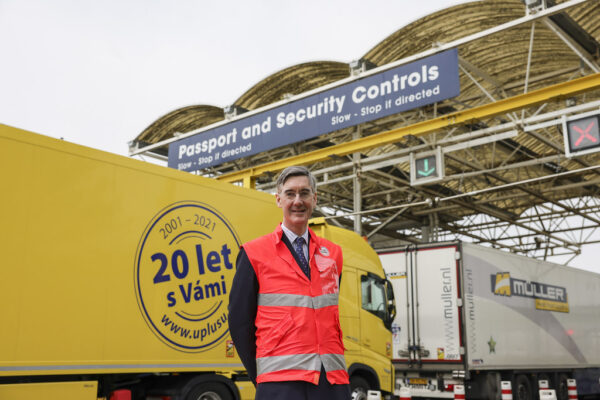Rees-Mogg puts Britain back on path to EU single market
The admission that full import controls are unviable shows that the game is up for hard Brexit.

Perhaps it was always inevitable that Brexit would end with a whimper, and not a bang. Sporting his hi-vis jacket at Euro Tunnel in Folkstone, the so-called “Brexit Opportunities Minister”, Jacob Rees-Mogg admitted it was not in the UK’s interest to introduce full import controls on goods coming from the EU. Under the auspices of a new review, which he said would only be published in the autumn, the government has held open the possibility that they might be introduced at the end of 2023. But the mood music makes this seem unlikely. Rees-Mogg has even admitted that the multimillion-pound facilities built to handle these tasks may now never be used. Port operators have threatened legal action to recover their costs.
As his job-title requires, Rees-Mogg attempted to put a positive spin on this move, identifying the need to protect supply chains from new shocks and not drive-up prices even further amid the cost of living crisis. But, in truth, this policy reveals the bankruptcy of the Brexit project.
What has the government announced?
There are five key measures which make up the latest Brexit u-turn:
- Sanitary and Phytosanitary (SPS) checks will not occur at a Border Control Post (BCP).
- Safety and security declarations on EU imports will not be required.
- Health certification for further SPS imports will not be needed.
- SPS goods will not need to be presented at a BCP.
- There will be no prohibitions or restrictions on the import of EU chilled meats.
SPS checks refer to the procedures followed when animals and plants, or goods of animal and plant origin, are imported. These take place to ensure that food, welfare, hygiene and other regulatory standards are being met. During its fraught negotiations with the EU, the UK had hoped to achieve a ‘regulatory equivalence’ agreement on SPS. This would have meant both sides considered one another’s SPS rules to be of the same standard as their own, thereby eliminating the need for such checks at the border. But because the UK was not willing to commit to maintaining EU standards as they developed, the government was not able to strike a deal on SPS regulation.
With a whimper, not a bang: the end of the road for hard Brexit
So, what does the u-turn entail in practice? British exporters already have to deal with these checks on the EU side when they move goods into the single market. But their EU competitors will not face the same bureaucracy when they export to Britain. This means that not only do French farmers enjoy free access to the rest of the single market, but they even have a privileged position when it comes to selling goods in the UK as well. It’s also not just SPS goods that are impacted by the government’s new announcement. Safety and security declarations, which UK exporters have to make when moving goods into the EU, will no longer be required on EU imports coming into Britain. As we’ve long argued on Brexit Spotlight, this creates the absurd situation in which a project sold on nationalist lines as an exercise in standing up for Britain simply improves the competitive position of the EU side.
This is why the Rees-Mogg announcement shows that the game is up for the British exit from the single market. It is simply not tenable to create such asymmetric trading relations with a very large economic bloc on Britain’s doorstep. Britain has essentially accepted EU regulation will continue to operate, and goods coming from the single market will not face the same regulatory burdens as those from elsewhere, but without negotiating equivalent British freedoms to sell goods in the EU. This is self-evidently unsustainable. If the most nationalistic government in recent British history is not able to fully extricate the country from the European market, then it simply isn’t possible. The question now is when – not if – Britain re-joins the single market.
May 2, 2022
Brexit Spotlight is run by Another Europe Is Possible. You can support this work by joining us today. The website is a resource to encourage debate and discussion. Published opinions do not necessarily represent those of Another Europe.





